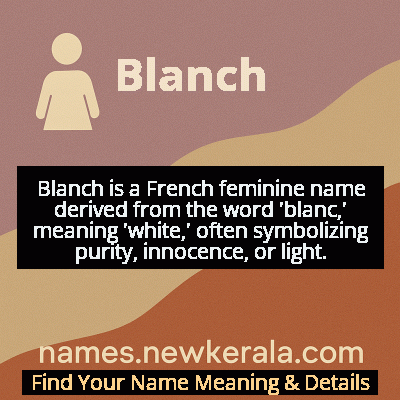Blanch Name Meaning & Details
Origin, Popularity, Numerology Analysis & Name Meaning of Blanch
Discover the origin, meaning, and cultural significance of the name BLANCH. Delve into its historical roots and explore the lasting impact it has had on communities and traditions.
Name
Blanch
Gender
Female
Origin
French
Lucky Number
4
Meaning of the Name - Blanch
Blanch is a French feminine name derived from the word 'blanc,' meaning 'white,' often symbolizing purity, innocence, or light.
Blanch - Complete Numerology Analysis
Your Numerology Number
Based on Pythagorean Numerology System
Ruling Planet
Uranus (Rahu)
Positive Nature
Strong sense of order, loyal, practical, and disciplined.
Negative Traits
Stubborn, overly serious, rigid, and prone to feeling restricted.
Lucky Colours
Blue, gray.
Lucky Days
Saturday.
Lucky Stones
Blue sapphire.
Harmony Numbers
1, 7, 8.
Best Suited Professions
Managers, engineers, accountants, organizers.
What People Like About You
Dependability, discipline, practicality.
Famous People Named Blanch
Blanch of Castile
Queen Regent of France
Successfully governed France as regent for her son Louis IX during his minority
Blanch of Lancaster
English noblewoman
Mother of King Henry IV and grandmother of the Lancastrian line
Blanch of Namur
Queen Consort of Sweden and Norway
Played significant role in Scandinavian politics during the 14th century
Blanch of Artois
Countess regnant
Ruled Artois in her own right and arranged important political marriages
Name Variations & International Equivalents
Click on blue names to explore their detailed meanings. Gray names with will be available soon.
Cultural & Historical Significance
In literary tradition, the name Blanch/Blanche appears in various forms across European literature. Geoffrey Chaucer featured a Blanche in his poem 'The Book of the Duchess,' written as an elegy for Blanche of Lancaster. The name's symbolic connection to purity and nobility made it a popular choice for characters representing idealized femininity in medieval romance literature. During the Victorian era, the name experienced renewed popularity as part of the Gothic revival and romantic nostalgia for medieval chivalry. The name's enduring presence in Western culture reflects its ability to embody both historical gravitas and timeless ideals of feminine virtue and strength.
Extended Personality Analysis
Individuals named Blanch are typically associated with a complex blend of traditional virtues and inner strength. They often project an aura of calm dignity and refined elegance, combined with practical intelligence and organizational capabilities. Historically, women named Blanch have demonstrated remarkable leadership skills—Blanche of Castile's successful regency being a prime example—suggesting that the name carries associations of competent authority and diplomatic skill. Modern Blanches often exhibit strong moral compasses, valuing honesty and integrity in their personal and professional relationships. Their 'white' symbolism extends to their approach to life: they tend to seek clarity, truth, and straightforward solutions to complex problems.
Psychologically, Blanches are often perceived as balanced individuals who combine emotional sensitivity with rational thinking. They typically possess excellent communication skills and a natural ability to mediate conflicts, making them valuable in team environments and leadership positions. Their association with purity doesn't necessarily mean naivete; rather, it suggests a preference for transparency and ethical conduct. Many Blanches display artistic appreciation and creative talents, particularly in fields requiring aesthetic judgment or cultural understanding. They often serve as pillars in their communities or families, providing stability and wisdom during challenging times. The name suggests someone who maintains their composure under pressure while remaining authentically connected to their core values and principles.
Modern Usage & Popularity
In contemporary naming practices, Blanch has transitioned from a common given name to a distinctive vintage choice with considerable charm. While the spelling 'Blanche' remains more prevalent, 'Blanch' maintains its appeal as a slightly more unusual variant. According to naming databases and social security records, the name reached its popularity zenith between 1880-1920, then gradually declined throughout the 20th century. However, the 21st century has witnessed a modest revival as part of the broader trend toward vintage and literary names. Modern parents choosing Blanch often appreciate its historical significance, elegant simplicity, and strong feminine identity. The name appears most frequently in France and French-speaking regions, though it has international recognition through literary characters like Blanche DuBois from 'A Streetcar Named Desire.' Current usage trends show it being selected by parents seeking names that are both classic and distinctive, offering a refreshing alternative to more common vintage revivals like Eleanor or Charlotte. Its continued presence in popular culture ensures that while uncommon, the name remains familiar and accessible to modern audiences.
Symbolic & Spiritual Meanings
The symbolic resonance of Blanch extends far beyond its literal meaning of 'white,' encompassing layers of cultural, spiritual, and psychological significance. In Western symbolic systems, white represents the synthesis of all colors, making Blanch symbolic of completeness, unity, and spiritual enlightenment. The name evokes the pristine quality of untouched snow—suggesting both fragility and transformative potential. In alchemical tradition, the 'albedo' or whitening stage represents purification and the achievement of spiritual clarity, making Blanch metaphorically associated with personal transformation and enlightenment. The name also carries lunar symbolism, connecting it to intuition, femininity, and cyclical renewal.
In color psychology, white represents new beginnings, cleanliness, and simplicity—qualities often reflected in the personalities of those named Blanch. The name suggests someone who brings light to dark situations or provides moral clarity in complex circumstances. In heraldic tradition, white (argent) symbolizes peace, sincerity, and moon-related qualities, reinforcing the name's connection to truthful communication and emotional authenticity. Metaphorically, Blanch represents the blank page or clean slate—the potential for new creation and untainted possibilities. This makes the name particularly symbolic for individuals who embrace change, value authenticity, and seek to make positive impacts in their communities. The enduring symbolic power of Blanch lies in its ability to represent both ancient virtues and contemporary ideals of transparency, renewal, and enlightened leadership.

